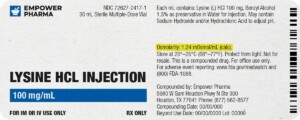Contraindications
Mirtazapine has a black box warning due to its potential to paradoxically worsen depression and anxiety in some individuals, and in some cases, it may potentially increase the risk of suicidal thoughts.[1]
Mirtazapine is contraindicated in patients currently taking monoamine oxidase inhibitors (MAOIs) or those who have used them in the past 14 days due to the risk of serious and potentially fatal interactions, including serotonin syndrome. This precaution may extend to other medications that may also potentially increase serotonin levels, such as methylene blue or linezolid.[1][2]
Precautions
Agranulocytosis:
Cases of severe neutropenia and agranulocytosis have been reported.[3]
Hepatic and Renal Impairment:
Use with caution in patients with hepatic or renal impairment, as these conditions may affect drug clearance.[1]
Seizure Risk:
Caution is advised for those with a history of seizures due to potential risk.[4]
Metabolic Effects:
Mirtazapine, like other antidepressants, has been associated with weight gain and metabolic issues, which may lead to treatment discontinuation despite its potential benefits. These changes may potentially impact glycemic control and lipid levels, though evidence on overall metabolic function is inconsistent. Additionally, depression may also increase the risk of obesity and metabolic disorders, which may complicate patient care. Factors such as dietary changes, reduced physical activity, and hormonal imbalances during depression may potentially contribute to weight gain independently of medication use. Careful monitoring of weight and metabolic health is recommended for patients on mirtazapine, particularly those with pre-existing metabolic concerns.[5]
Orthostatic Hypotension:
Mirtazapine typically has minimal effects on blood pressure but may potentially cause orthostatic hypotension, potentially leading to dizziness and falls. This risk is particularly relevant in individuals with cardiovascular conditions. Careful monitoring of blood pressure is recommended when starting or adjusting mirtazapine, especially in elderly patients or those with pre-existing risk factors for falls.[6]
Anticholinergic Effects:
Mirtazapine may exhibit low anticholinergic activity; however, it may still cause side effects such as constipation. This potential effect may stem from its adrenergic actions rather than cholinergic pathways.[7]
Geriatric Considerations:
Studies have not identified specific geriatric problems that would limit the use of mirtazapine in elderly patients. However, older adults may be more prone to confusion, unusual drowsiness, and age-related liver, kidney, or heart issues, which may necessitate caution and dosage adjustments when prescribing mirtazapine to this population.[8]
NOTE: This list may not include all possible contraindications and precautions.


 Propranolol Tablets
Propranolol Tablets Ketamine ODT
Ketamine ODT Ketamine Nasal Spray
Ketamine Nasal Spray Sertraline Tablets
Sertraline Tablets Bupropion HCl SR Tablets
Bupropion HCl SR Tablets Trazodone Tablets
Trazodone Tablets Ketamine Troches
Ketamine Troches Oxytocin ODT
Oxytocin ODT